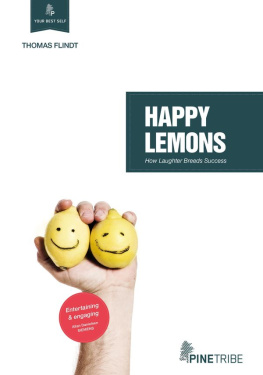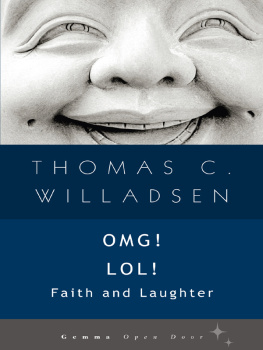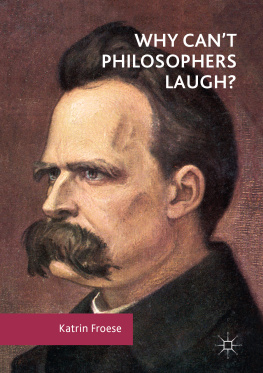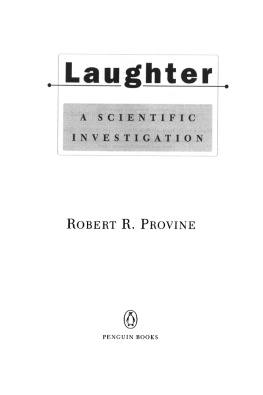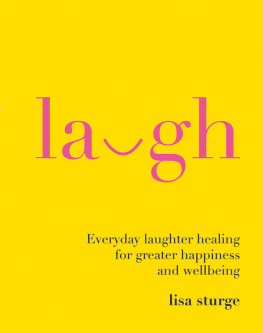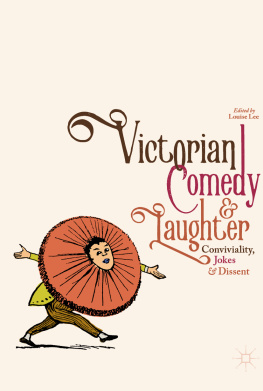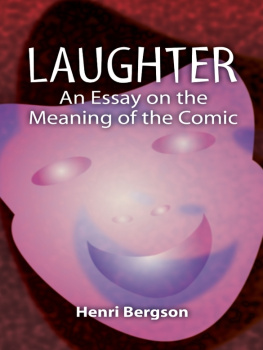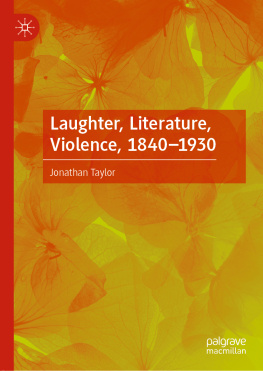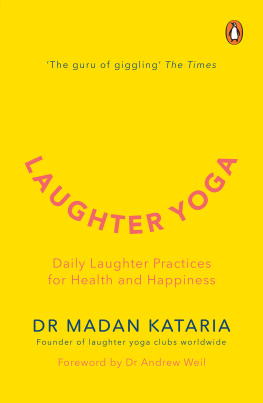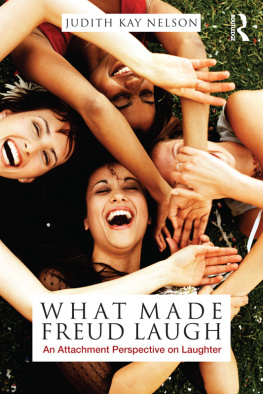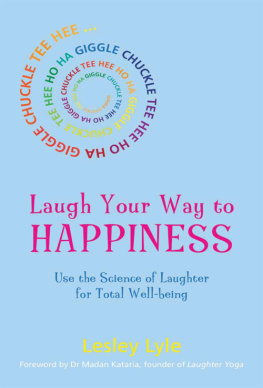In the Event of Laughter
Psychoanalytic Horizons
Psychoanalysis is unique in being at once a theory and a therapy, a method of critical thinking and a form of clinical practice. Now in its second century, this fusion of science and humanism derived from Freud has outlived all predictions of its demise. Psychoanalytic Horizons evokes the idea of a convergence between realms as well as the outer limits of a vision. Books in the series test disciplinary boundaries and will appeal to scholars and therapists who are passionate not only about the theory of literature, culture, media and philosophy but also, above all, about the real life of ideas in the world.
Series Editors
Esther Rashkin, Mari Ruti and Peter L. Rudnytsky
Advisory Board
Salman Akhtar, Doris Brothers, Aleksandar Dimitrijevic, Lewis Kirshner, Humphrey Morris, Hilary Neroni, Dany Nobus, Lois Oppenheim, Donna Orange, Peter Redman, Laura Salisbury, Alenka Zupani
Volumes in the Series
Mourning Freud
Madelon Sprengnether
Does the Internet Have an Unconscious? Slavoj iek and Digital Culture
Clint Burnham
In the Event of Laughter: Psychoanalysis, Literature and Comedy
Alfie Bown
On Dangerous Ground: Freuds Visual Cultures of the Unconscious
Diane ODonoghue
Born After: Reckoning with the German Past (forthcoming)
Angelika Bammer
The Analysts Desire: Ethics in Theory and Clinical Practice (forthcoming)
Mitchell Wilson
At the Risk of Thinking: An Intellectual Biography of Julia Kristeva (forthcoming)
Alice Jardine

Contents
Many books on comedy begin with a little anecdote about how the author had a good laugh writing the book, perhaps even starting off the discussion with a joke or two, or at least with a humorous opening gambit of some kind. Sometimes the temptation to have a laugh creeps onto the front cover of the book, making its presence felt in the illustration or in the books subtitle, suggesting that within the book we might find a lighthearted academia that affords a much-needed relief from the all-too-serious attitudes that so often characterize the university. This is not a book which arises from this kind of atmosphere at all.
Instead, the book has come out of many years of study and academic discussion, very little of which has had the lightness that we often associate with comedy, even less of which has been fun or funny, and absolutely none of which could even be said to have been a relief. If there has been a laughter ghosting the decade of reading philosophy and literature that has finally resulted in this book, it has been a threatening and unsettling laughter that has pointed to the weakness of the academy, to the fragility of philosophy and to the anxiety of my own contribution. It was the power that laughter has to be something completely opposed to a light relief, something powerfully unsettling which leaves us feeling highly anxious, which caused me to undertake this project.
A number of people deserve a special thank you for their role in these discussions and, therefore, in making this book possible. These people are, in some kind of order, Mladen Dolar, Jeremy Tambling, James Smith, David Matthews, Anca Parvulescu, Gregor Moder, Alenka Zupani, David Alderson, Jonathan Hall, Jack Sullivan, Daniel Bristow, Ian Parker, Lucas Ballestin, Andreja Zevnik, Tony Brown and Alexandre Pais. I wish to make a special thank you to my wife Kim, without whom I would not have been able to finish this project; to my mother Tracy, without whom it would never have begun; and to my daughter Lyra, who is just beginning to laugh.
A version of has appeared in American Journal of Psychoanalysis (July, 2017) and is included here with permission.
References to Shakespeare are from The Norton Critical Edition, ed. Stephen Greenblatt (London: Norton, 1997).
References to Freud are from Sigmund Freud, The Standard Edition of the Complete Psychological Works of Sigmund Freud, ed. and trans. James Strachey et al., 24 vols (London: Vintage, 2001).
References to regularly quoted Jacques Lacan texts are as follows:
| S7 | The Ethics of Psychoanalysis, ed. Jacques Alain-Miller, trans. Dennis Porter (London: Norton, 1992). |
| S10 | Anxiety, ed. Jacques Alain-Miller (Cambridge: Polity Press, 2014). |
| S11 | The Four Fundamental Concepts of Psychoanalysis, ed. Jacques Alain-Miller, trans. Alan Sheridan (London: Norton, 1998). |
| S17 | The Other Side of Psychoanalysis, ed. Jacques Alain-Miller, trans. Russel Grigg (London: Norton, 2007). |
Imitation of laughter and (the devils) original laughter are both called by the same name.
Milan
We all enjoy a good laugh. But is laughter purely and completely enjoyable? Whether we see laughter as a liberating release or as a tool for social control, we rarely question the fact that laughing feels good. The positive feeling we often get from laughter may have its roots in social, biological or psychological conditions, or in a combination of all three. What is sometimes called nervous laughter is perhaps the exception, a laughter that is not seen as inherently or at least entirely enjoyable. Yet, it is not difficult to suggest that there is anxiety within every laugh, or that when we laugh, anxiety is never far away. Laughter is joyful and expressive, even celebratory, but it is also unsettling and disconcerting, and it often leaves us feeling unsure of ourselves. When we are in the midst of throes of laughter we can feel confident, free and assured, but a deep anxiety often follows closely on the tail of these affects. A whole history of art and literature, in its multiple depictions of laughter and laughing subjects, has picked up on this uneasy doubleness, showing laughter as simultaneously horrifying and full of delight. It is this doubleness that makes laughter so difficult to study and so elusive and hard to pin down. In short, this book is an attempt to explore why and how laughter is so paradoxically worrying and pleasurable.
Several centuries of philosophical study and infinitely more hours of general discussion, not to mention scientific and psychological investigations, have asked the question of why we laugh and of what causes laughter. Every discussion of why a particular joke is funny is a different attempt to answer this question. By contrast, very little attention has ever been dedicated to thinking about laughters effects, to what is happening to us when we laugh and to how
To be more specific, at the heart of this book I explore the relationship between laughter and anxiety by arguing that laughter should be thought of in terms of what the French philosopher and psychoanalyst Alainerects and constructs ideologies and subjectivities, but simultaneously calls these very things into question. This book therefore offers not an alternative interpretation of what laughter is, nor another answer to the question of why we laugh, but an alternative framework for discussing laughter that escapes, I hope, some of the problems that characterize existing discussions.
The idea of reading laughter as the event is not something that Alain Badiou himself would be likely to agree with, and so this book should not be thought of as an application of Badious theory in a new context the context of laughter. For Badiou, there are four kinds of event, and laughter is far from being one of them. A Badiouian event is a rare and unusual occurrence, something that occasionally interrupts the trajectory of things and reorders the world around it. Arguing that laughter is an event means seeing this process very differently as something that occurs a great many times each day to a great many people and in a great many different ways. The book therefore involves rethinking the event itself.


